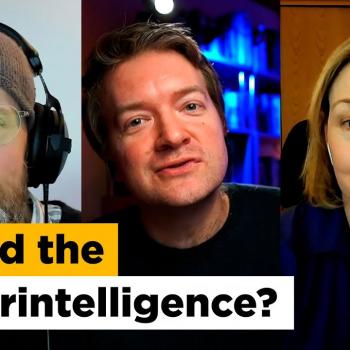
Erik Strandness shares some further thoughts about a recent debate between Bishop Robert Barron and Alex O’Connor (aka CosmicSkeptic). You can read part one here.
I, like many others, have stared at the vast night sky and asked: “What lies beyond?” It’s a crude form of the contingency argument that I think most people have entertained at one time or another. Why would we even ask that question? I believe it’s because we see a contingent sky and wonder if maybe there is a larger non-contingent behind it all.
In a recent Big Conversation between Bishop Robert Barron and Alex O’Connor, Barron described this as a “luring horizon” that calls us beyond all knowledge. A horizon that he believes represents God:
“God, if you want, is not of the things in the world that I might find, any of the truths my mind might discover, it’s not some good I might achieve, but a kind of a luring horizon for the inner dynamism of the spirit.”
C.S. Lewis described this desire for the horizon as ‘sehnsucht’:
“The inconsolable longing in the human heart for we know not what. A yearning for a far, familiar, non-earthly land one can identify as one’s home.”
Lewis was surprised by the joy he experienced when he realized that this longing was complete only in that which he couldn’t possess. It’s a way of thinking that deviates from our usual ‘desire and acquire’ mentality and can be more accurately described as ‘admire the desire’. Contrary to what our critics may say, this longing for the horizon doesn’t eliminate the intellect but engages it even more fervently:
“Such longing is in itself the very reverse of wishful thinking: it is more like thoughtful wishing.” (C.S. Lewis – Narrative Poems)
Perhaps, O’Connor needs to distinguish between knowledge and his insatiable desire to know. The longing he has for logical certainty may never be satisfied until he encounters Logic Itself.
Pursuing the Perimeter
O’Connor described the acquisition of knowledge as a circle that expands every time a new question is generated by a new piece of information. Academicians view this receding horizon as the elusive “theory of everything” while the Christian views it as God. O’Connor appropriately raised the concern that without an honest intellectual pursuit of the edges of knowledge, Christianity offers nothing more than an academically lazy God-of-the-horizon argument. If we view God as a vague horizon then any god will do.
It’s acceptable to acknowledge a certain mystery surrounding God but unacceptable if we use that as an excuse not to plumb its depths. I would argue that since the expanding circle of knowledge is full of information, we can infer that what lies on the edge is an Information Generator. We have clues about the identity of this God because He has left a paper trail of revelation.
Unlike Tiamat, Brahman or Mother Earth, the Christian God has been a revealer since the very beginning when “God said…” He has made Himself known through His creational words, scriptural Word and incarnate Word. And while we can’t know all of His thoughts, we are acutely aware that He has spoken. We are the only creatures on this planet equipped with divine voice recognition software and, as such, we know the Shepherd’s voice.
The horizon calls to both the atheist and the Christian. The difference, however, is that the Christian has evidence to suggest that it ends in a Mind while the atheist believes it ends in a warm little pond. As we attempt to move closer to the luring horizon, we need to ask ourselves if we are pursuing the material edge of reality or longing for the beginning of eternity.
What is Faith?
I think it’s fair to define faith as confidence in the identity of the Horizon. O’Connor argued that reason should be able to bring us to its doorstep, while Barron said that reason could only bring us so far and then we would have to take a step of faith:
“Faith, authentically construed, is always supra-rational. It’s a surrender at the far side of reason.”
Barron explained that it’s not a step into the unknown because, “Faith is a response to the revealing God.” O’Connor respects the rational pursuit of God, but I suspect he would have a difficult time laying down his intellect and “surrendering at the far side of reason”.
I got the sense that O’Connor would become a believer only if God could be logically proven and not because he had run out of syllogisms.
Quantum Questions
I think an excellent example of the differences between the way the two guests viewed the pursuit of God occurred when they discussed the trinity (available as part of the podcast version – YouTube viewers will need to subscribe to The Big Conversation newsletter to receive it as a bonus video). O’Connor couldn’t get past the logical impossibility of three adding up to one, while Barron embraced it in terms of the love between the lover and beloved.
“If I have prophetic powers, and understand all mysteries and all knowledge, and if I have all faith, so as to remove mountains, but have not love, I am nothing.” (1 Corinthians 13:2)
I think O’Connor needs to look past analytical philosophy because something deeper is going on. Analytical philosophy is like classical physics – it explains our day-to-day operations but breaks down once you ask deeper quantum-like questions. I hope that while O’Connor does the important work of counting petals, he also takes a moment to smell the roses. C.S Lewis explains it this way:
“The books or the music in which we thought the beauty was located will betray us if we trust them; it is not in them, it only came through them, and what came through them was longing. These things – the beauty, the memory of our own past – are good images of what we really desire; but if they are mistaken for the thing itself they turn into dumb idols, breaking the hearts of their worshippers. For they are not the thing itself; they are only the scent of a flower we have not found, the echo of a tune we have not heard, news from a country we have never yet visited.” (C.S. Lewis – The Weight of Glory)
The True Starting Point
It wouldn’t be a proper discussion between an atheist and Christian if the subject of pain and suffering wasn’t brought up and the show didn’t disappoint.
O’Connor interestingly wanted to use pain and suffering as a logical starting point for the truth of Christianity:
“If I cannot get from the existence of suffering, which is undeniable. If I can’t find a root from that suffering to the existence of a loving God, then I can’t use Christianity to make sense of the world that I find myself in.”
I appreciated his desire to take perhaps the most troubling issue in this debate and use it as a starting point to build a logical argument for the truth of Christianity, because then if it fails this most important test it can be rightly rejected. However, I think he has bypassed a crucial step in his argument. I think an even more foundational starting point is to ask why people think pain and suffering is bad in the first place. Surely, a material creature that evolved through thousands of years of survival of the fittest wouldn’t find pain and suffering surprising at all.
Garden Life
If the road to the most highly evolved creature involved the pain, suffering and death of the unfit, why did we suddenly wake up and think it was so horrific? While the existence of Eden may be controversial, we all seem to think that a comfortable garden life is preferable to a thorny wilderness existence.
Why are we the only creatures on the planet that save extinct species even though they have failed evolution 101? Why do we waste resources trying to get beached whales that don’t seem to understand survival of the fittest back out to sea?
We seem to think creatures shouldn’t suffer, yet our nearest common ancestors don’t seem to give it a second thought. The first question in any logical argument about pain and suffering should be: why do we care?
Justifying or Redeeming Suffering?
I was a bit disappointed by Barron’s appeal to God’s sovereignty as an explanation for pain and suffering. He compared God to the author of a book who knows the entire plot line and a cast of human characters who may experience tragedy but are unaware of its importance in the larger story. O’Connor made a profound point:
“It’s good for the plot line, but it’s not good for the character and that’s the point here…The theodicy that’s been proposed here is one saying that evil is allowed because some greater good can be brought from it, which means that the corollary of this is that any time something evil exists, anytime bad exists, it exists precisely because some good is going to be brought out of it. That is to say that evil is an indication that something good is happening…which is to say that these things are worth celebrating.” (My emphasis)
Personally, I have a hard time justifying pain and suffering by appealing to God’s sovereignty alone. I do believe that God allows pain and suffering, not to teach a lesson, but rather to allow for the possibility of redemption. The ultimate manifestation of the Christian God is as a suffering servant, a God that takes on pain and suffering, and rather than explain it away, transforms it into the best news ever.
Pain and suffering exist whether we believe in God or not. Therefore the question is: what do we do with this ever-present reality? The Buddhist avoids it, the Hindu believes it refines them for the next life, the New Spiritualist tries to suppress it by thinking happy thoughts and the atheist shrugs their shoulders. The Christian, however, looking to the example of their Savior redeems it for something better.
Philosopher Chaplain
Justin turned the tables and asked O’Connor to offer the atheist response to pain and suffering. O’Connor honestly admitted that he had no response, but said he wouldn’t give false consolation:
“I don’t know what I would say to a friend who is dying. I don’t claim to have an explanation for why this is happening. I don’t claim to have an answer to how justice will be served, but the one thing I won’t do is offer false consolation to my dying friend…Unless I’m certain and I’m able to say listen I know why this is happening, don’t worry, you can relax, everything’s going to be OK. If I don’t have philosophically sufficient grounds to say that, then it would not just be foolish but malicious of me to lie to them.”
I appreciate O’Connor’s allegiance to his intellectual integrity, but as one who has had to walk families through the death of their babies, I can assure him that the vast majority do believe that something lies beyond the horizon and are grateful when someone tells them everything will be OK. I’m thankful we have philosophers to make sure we think straight, but I am also relieved that ministering to dying patients isn’t included in their job description. Syllogisms pale in comparison to prayers. And survival of the fittest is inadequate consolation for those whose health is failing.
I hope I have given you some ideas to ponder and I want to encourage you to listen to the program because you will be blessed. It was an outstanding discussion between two formidable gentlemen and if the rest of the Big Conversations are as excellent as this episode, then we are in store for a wonderful year of transformative talk.
Click here to watch Bishop Robert Barron and Alex O’Connor discuss this topic further on The Big Conversation.
Subscribe to the Unbelievable? podcast
Join NT Wright, Tom Holland, Josh McDowell and others online at the Unbelievable? conference on 15th May












